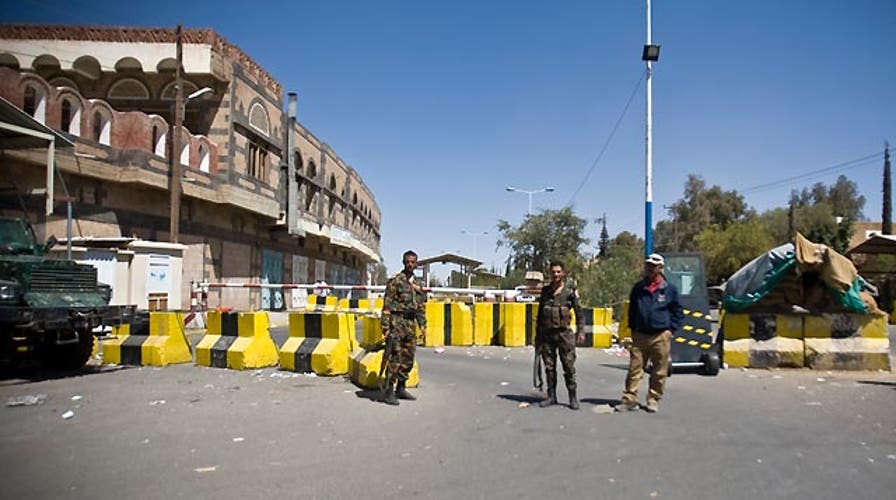This is a rush transcript from "Special Report," February 11, 2015. This copy may not be in its final form and may be updated.
(BEGIN VIDEO CLIP)
NICHOLAS RASMUSSEN, NATIONAL COUNTERTERRORISM CENTER: The United States and our allies are increasingly concerned with the more than 20,000 foreign fighters we assess have traveled to Syria from over 90 different countries of origin. We assess that at least 3,400 of these fighters are from western countries. And that number includes, also, over 150 U.S. persons who have either traveled to the conflict zone or who attempted to do so.
(END VIDEO CLIP)
BRET BAIER, ANCHOR: The foreign fighters increasing, director of National Counterterrorism Center with that. Meantime, in Yemen, a situation that is devolving. The U.S. embassy there is now closed. And we are getting reports that the embassy personnel left and they left their vehicles and they have been taken over by the Houthi rebels there on the ground. We're back with the panel. Charles, you heard Chairman Thornberry talking about his concern about Yemen as just one of the hot spots.
CHARLES KRAUTHAMMER, SYNDICATED COLUMNIST: Look, what just happened in Yemen is on the one hand, it's sort of humiliating. It wasn't quite like the evacuation of Saigon, but it was not -- it was a panicked – it was kind of a withdrawal that was done very quickly, weapons left behind and the rebels come in and take the Marine side arms, not exactly a pleasant scene.
But the real problem is less psychological than what's happening on the ground. On two fronts it's a devastating set back. Number one, it makes access to attacking AQAP, Al Qaeda in Iraq, the most active of Al Qaeda cells in the world, it makes access hitting them extremely difficult.
But second, and this is what is overlooked largely in the analysis, is that it is now going to become an ally of Iran. The Houthis -- the ones who took over the state -- are closely supported by Iran, and Iran has spoken of turning Yemen into the equivalent of Hezbollah. Hezbollah is Iran's way of operating in Lebanon. Well, this is the way it wants to operate in Yemen.
And as you showed on the map, you have got Iran now dominating the three Arab capitals in the North, Baghdad, Damascus, Beirut, and now with Yemen in the lower left-hand corner, you have got a surrounding of all the pro-American states, Jordan, and the Gulf States, by Iranian clients. This is a big setback and it scares the Gulf States to death.
BAIER: Juan?
JUAN WILLIAMS, SENIOR EDITOR, THE HILL: Well, I think what Charles just laid out is the reason why you would hope that Muslim countries like Jordan, which is already now engaging in the fight, but also the Saudis would themselves put some skin in the game. Get active instead of always relying on the United States to come in and serve their interests. Clearly, they are afraid of Iran too. They are afraid of Iran rising to the point where they come to dominate the region. And yet they always rely on the United States.
BAIER: Sure, but it's under the umbrella of the U.S. negotiating with Iran on this nuclear deal, and what they perceive, at least when they talk about it privately, as a pullback and leaving a vacuum in the Middle East by the U.S.
WILLIAMS: Well, that certainly hasn't happened yet. They are all fearful, and I think especially Israel, is fearful that the Iranian deal will concede too much. And that's a concern. But what we are talking about in the moment in dealing with ISIL and dealing with this takeover in Yemen, which essentially it was local politics. It was the rebels against, not against the United States. I mean, there is no analogy to Saigon.
BAIER: Sure.
WILLIAMS: But this is, again, damaging to our ability, to the ability of the Muslim world as Iran gains strength.
BAIER: In the region, though, no more U.S. embassy in Sana'a in Yemen, in Libya, closed down. Somalia, Syria, obviously, haven't had one in Iran for quite some time.
WILLIAMS: Right.
GOLDBERG: And this, not to go too much back to the AUMF, but this raises another problem with the AUMF. When you put a three year limit on it, it really signals to a lot of people in the region how unreliable the United States might be and how uncommitted it is to sort of seeing all of this through. Obama was elected to end wars, not to start them. We have two more years left with Obama. He does not seem like a guy who wants to fully engage in this fight no matter what facet of it there is.
He said in that interview with Vox.com which you guys talked about last night that he sees terrorism as the way a big city mayor views street crime. Well, you know, street criminals don't take over our embassies and they don't declare that they are going to try to create a global caliphate.
BAIER: More on this as we will continue this in the online show. If you haven't been there, it's a lot of fun. Join in and stay tuned for some highlights from our most recent online show.
Content and Programming Copyright 2015 Fox News Network, LLC. ALL RIGHTS RESERVED. Copyright 2015 CQ-Roll Call, Inc. All materials herein are protected by United States copyright law and may not be reproduced, distributed, transmitted, displayed, published or broadcast without the prior written permission of CQ-Roll Call. You may not alter or remove any trademark, copyright or other notice from copies of the content.

